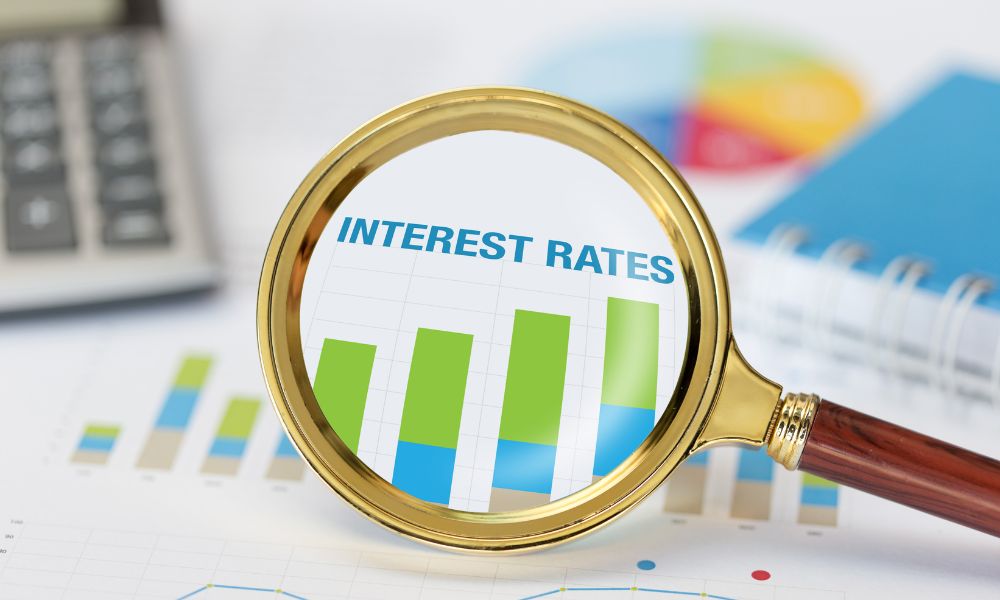Understanding the intricacies of business loans is essential for any entrepreneur or business owner. One key factor that often determines the cost of borrowing is the interest rate on the loan. In this article, we will dive deep into the world of business loan interest rates to decipher their meaning and impact on your financial situation.
What is a Business Loan Interest Rate?
Key takeaway:
- Understanding business loan interest rates: It is important to comprehend how interest rates are calculated and the various types of interest rates available for business loans.
- Factors that determine business loan interest rates: Key factors such as credit score, business financial health, loan amount and term, and collateral play a significant role in determining the interest rate offered for a business loan.
- Tips for obtaining the best interest rate: To secure the most favorable interest rate, focus on improving your credit score, strengthening your business financials, shopping around and comparing loan offers, and negotiating with lenders.
Understanding Business Loan Interest Rates
Understanding business loan interest rates is essential when considering financing options for your business. Additionally, several key factors should be taken into account:
- Loan term: It is important to note that shorter loan terms typically come with lower interest rates. Conversely, longer terms may have higher rates due to the increased risk associated with the extended duration for the lender.
- Business credit score: Lenders consider a higher credit score as an indication of lower risk, resulting in lower interest rates being offered.
- Loan amount: Larger loans may have lower interest rates due to the economies of scale for lenders. Conversely, smaller loans may have higher rates to compensate for administrative costs.
- Collateral: Providing collateral reduces the lender’s risk, which may lead to a lower interest rate being offered.
- Market conditions: Interest rates can fluctuate based on economic factors. Hence, it is important to stay updated on current market conditions.
- Lender type: Different lenders, such as banks, credit unions, or online lenders, may offer varying interest rates based on their underwriting criteria.
By understanding these factors, you can make an informed decision and secure the most favorable interest rate when obtaining a business loan. Additionally, keep in mind that interest rates may also be influenced by factors specific to your business and the overall lending environment.
What is a Business Loan Interest Rate?
A business loan interest rate refers to the percentage of the loan amount that a business will pay as a fee for borrowing the funds. The interest rate is determined by various factors such as the borrower’s credit score, the loan term, and the market conditions. It is important for businesses to carefully consider the interest rate when seeking a loan as it directly impacts the total cost of borrowing.
Higher interest rates can result in higher monthly payments and increased expenses for the business. Therefore, businesses should shop around and compare interest rates from different lenders to find the most competitive offer. Additionally, businesses should also consider the potential impact of interest rate fluctuations on their loan repayments.
By understanding what a business loan interest rate is and how it can affect their financials, businesses can make informed decisions when it comes to borrowing money.
Fact: According to a survey conducted by the Federal Reserve, the average interest rate for small business loans in the United States is around 6% to 7%.
How is Business Loan Interest Rate Calculated?
The calculation of a business loan interest rate involves several factors that lenders consider when determining the cost of borrowing:
- Your credit score: Lenders assess your creditworthiness to measure the risk of lending you money. A higher credit score typically results in a lower interest rate.
- Business financial health: Lenders evaluate your business’s financial statements, including revenue, expenses, and profitability, to determine your ability to repay the loan. A robust and stable financial position can lead to a lower interest rate.
- Loan amount and term: The loan amount and repayment period impact the interest rate. Larger loan amounts or longer terms may result in higher rates.
- Collateral: Offering collateral can provide security for the lender. It reduces their risk and can result in a lower interest rate.
The interest rate calculation may also depend on the specific type of business loan:
- Prime Rate + Interest Rate Markup: Some loans base their interest rates on the prime rate, which is set by financial institutions. Lenders add an additional markup based on your creditworthiness and other factors.
- Simple Interest Rates: With this method, interest is calculated based on the principal amount borrowed, without compounding over time.
- Factor Rates: This type of rate is commonly used in merchant cash advances. The lender determines the total repayment amount upfront and calculates the interest based on that figure.
- Annual Percentage Rate (APR): The APR includes the annual interest rate and any additional fees or charges associated with the loan, providing a comprehensive measure of the total cost of borrowing.
The concept of charging interest on loans has been present for centuries, dating back to ancient civilizations such as Mesopotamia and Egypt. As economies evolved, interest rates became a fundamental aspect of lending, helping to balance risk and reward for both borrowers and lenders. Today, interest rates play a crucial role in the business world, shaping financial decisions and influencing economic growth.
Fixed vs. Variable Interest Rates for Business Loans
When it comes to business loans, there are two main types of interest rates to consider: fixed and variable. Here is a breakdown of the differences between fixed and variable interest rates for business loans:
- Fixed Interest Rates: With a fixed interest rate, the interest rate remains the same throughout the entire loan term. This means that your monthly payments will also remain constant, making it easier to plan and budget for the loan.
- Variable Interest Rates: On the other hand, variable interest rates can change over time. These rates are typically tied to a benchmark interest rate, such as the prime rate. If the benchmark rate goes up or down, your interest rate and monthly payments may also change accordingly.
Choosing between fixed and variable interest rates depends on your specific financial situation and risk tolerance. Here are a few factors to consider:
- Your financial goals: If you prefer stability and predictability in your loan payments, a fixed interest rate may be the better option for you.
- Market conditions: If interest rates are currently low and are expected to remain low, you might consider opting for a variable interest rate to potentially take advantage of any future decreases.
- Risk tolerance: If you can handle fluctuations in your loan payments and are comfortable with some level of uncertainty, a variable interest rate may be suitable.
In the end, it’s essential to carefully weigh the pros and cons of fixed and variable interest rates for business loans to make an informed decision that aligns with your financial goals and circumstances.
Factors that Determine Business Loan Interest Rates
When it comes to business loan interest rates, understanding the factors that determine them is crucial. In this section, we’ll uncover the key elements that influence these rates. We’ll dive into aspects like credit score, business financial health, loan amount, term, and collateral. From how your credit score impacts the interest rate to the role of collateral in securing a favorable rate, we’ll decode the factors that lenders consider when setting business loan interest rates. Get ready to navigate the world of borrowing with confidence!
Credit Score
Your credit score plays a crucial role in determining the interest rate you will receive on a business loan. Lenders use your credit score to assess your creditworthiness and determine the level of risk involved in lending to you. A higher credit score implies a lower risk, leading to a better interest rate. Conversely, a lower credit score may result in a higher interest rate as lenders perceive a higher risk of default.
Maintaining a good credit score is essential when applying for a business loan. Timely payments, low credit utilization, and a mix of credit types can positively impact your credit score. Conversely, late payments, high outstanding debt, and frequent credit applications can negatively affect your credit score, leading to higher interest rates.
It’s important to regularly check your credit score and address any errors or discrepancies that may be affecting your rating. By monitoring and improving your credit score, you can increase your chances of securing a business loan with a favorable interest rate.
Fact: Did you know that according to Experian, the average credit score of approved small business loan applicants in the United States is around 700?
Business Financial Health
Having a healthy business financial health is crucial when it comes to determining the interest rate on a business loan. Lenders carefully evaluate the stability and performance of a business to assess the level of risk associated with lending money. They take into account various factors including the profitability of the business, its cash flow, debt-to-income ratio, and credit history.
A business that exhibits a robust financial health, with consistent profitability, a strong cash flow, and a low debt burden, is more likely to secure a loan at a lower interest rate. Lenders perceive financially stable businesses as less risky and more capable of repaying the loan.
Conversely, if a business has poor financial health, such as a history of low profitability, erratic cash flow, or excessive levels of debt, lenders may consider it as a higher risk. Consequently, they might offer the loan at a higher interest rate as a way to compensate for the increased risk.
By diligently maintaining and enhancing your business’s financial health, you can enhance the likelihood of securing a loan at a favorable interest rate. This can be accomplished by consistently monitoring and managing your finances, reducing debt, increasing profitability, and maintaining a robust cash flow.
Fact: According to a study, businesses with a higher credit score and positive financial indicators are more likely to secure loans at lower interest rates, enabling them to save significant amounts of money over the loan term.
Loan Amount and Term
| Important Factors to Consider for Loan Amount and Term | |
| Numerical Details | Numerical Details about Loan Amount and Term |
| Loan Amount | When considering your loan amount and term, it is crucial to carefully assess the amount of money you need for your business. It should be sufficient to cover both your expenses and investment plans. |
| Loan Term | Choosing a suitable loan term that aligns with your business needs and your ability to make regular payments is of utmost importance. The loan term refers to the period within which you are required to repay the loan. |
| Interest Rates | Interest rates can vary depending on both the loan amount and term. It is essential to understand that higher loan amounts and longer terms may attract higher interest rates. Evaluating the impact of interest rates on the total cost of the loan and your repayment ability is crucial. |
| Repayment Ability | To determine your repayment ability for the chosen loan amount and term, carefully analyze your business’s cash flow and projected income. This analysis will ensure that you can make timely loan repayments without straining your business finances. |
| Creditworthiness | Your creditworthiness, including your credit score and the financial health of your business, plays a significant role in determining the loan amount and term you are eligible for. Lenders are more likely to offer favorable loan terms to borrowers with a strong credit history and financial stability. |
Collateral
Collateral plays a significant role in obtaining favorable terms and interest rates for a business loan. By providing valuable assets as collateral, borrowers can give lenders confidence in their ability to repay the loan, ultimately increasing their chances of securing financing at competitive rates.
- Collateral is an asset that a borrower pledges as security for the loan.
- It provides the lender with a form of guarantee in case the borrower defaults on the loan.
- Common types of collateral include real estate, equipment, inventory, and accounts receivable.
- The value of the collateral determines the amount of loan a lender is willing to provide.
- If the borrower fails to repay the loan, the lender can seize and sell the collateral to recoup their losses.
- The use of collateral reduces the risk for the lender, which can result in lower interest rates for the borrower.
- The type and value of collateral required may vary depending on the size of the loan and the lender’s policies.
- It’s important to carefully evaluate the potential risks and benefits of pledging collateral for a loan.
- Borrowers should make sure they have a clear understanding of the collateral requirements and the consequences of defaulting on the loan.
Types of Business Loan Interest Rates
When it comes to business loans, understanding the different types of interest rates is key. In this section, we’ll dive into the specifics, giving you a breakdown of prime rates with interest rate markups, simple interest rates, factor rates, and annual percentage rates. It’s time to decode the complexities of loan interest rates and equip yourself with the knowledge to make informed financial decisions for your business. Get ready to uncover the facts and figures that will shape your borrowing strategy!
Prime Rate + Interest Rate Markup
When it comes to business loan interest rates, one type to consider is the prime rate + interest rate markup. This structure combines the current prime rate set by the Federal Reserve with an additional markup percentage determined by the lender.
| Prime Rate | Interest Rate Markup | Total Interest Rate |
| 3.25% | 2% | 5.25% |
| 3.25% | 3% | 6.25% |
| 3.25% | 4% | 7.25% |
The prime rate serves as a benchmark and is influenced by economic factors such as the federal funds rate. The interest rate markup reflects the lender’s risk assessment and profit margin. By adding these two components together, the total interest rate for the business loan is determined.
It’s important to note that the prime rate is subject to change over time, and lenders may adjust their interest rate markups based on various factors such as the borrower’s creditworthiness and the overall market conditions.
Understanding the prime rate + interest rate markup structure can help businesses evaluate and compare loan offers from different lenders. By analyzing the total interest rate, businesses can make informed decisions about their borrowing costs and choose the option that best aligns with their financial goals.
Simple Interest Rates
Simple interest rates is a straightforward method of calculating the interest on a business loan. Instead of applying compound interest, where interest is calculated on both the principal amount and any accumulated interest, simple interest rates is calculated solely on the principal amount.
To calculate simple interest rates, you multiply the principal amount by the interest rate and the duration of the loan. For example, if you have a business loan of $10,000 with a simple interest rate of 5% for one year, the interest would be $500 ($10,000 x 0.05 x 1).
Simple interest rates are commonly used for short-term loans or loans with fixed terms. They are easier to understand and calculate compared to other interest rate structures. However, it’s important to note that simple interest rates may not be the most cost-effective option for long-term loans.
When considering a loan with simple interest rates, be sure to assess the overall cost of the loan and any additional fees or charges. Compare the interest rates offered by different lenders to secure the best deal for your business.
It is crucial to have a clear understanding of the terms and conditions of the loan agreement, including any potential penalties for late payments or early repayment. Ensure that you can comfortably afford the repayment schedule based on the simple interest rates before committing to a loan.
Factor Rates
Factor rates, also known as business loan interest rates, are commonly used by alternative lenders. These rates have several unique characteristics:
- Non-percentage: Unlike other interest rates, factor rates are not expressed as a percentage. Instead, they are represented as decimal figures. For example, a factor rate of 1.2 means that you will repay $1.20 for every $1 borrowed.
- Fixed amount: Factor rates determine the total amount you will repay, regardless of how quickly you repay the loan. Unlike traditional interest rates, factor rates do not change over time.
- Short-term: Factor rate loans are typically short-term loans, with repayment periods ranging from a few months to a year. Since the total amount to be repaid is fixed, the shorter the repayment period, the lower the cost of the loan.
- Simple calculation: Calculating the cost of a loan with a factor rate is straightforward. You multiply the loan amount by the factor rate to determine the total repayment amount.
- Higher cost: Factor rates are generally higher than traditional interest rates, making them suitable for businesses with lower credit scores or for those seeking quick and accessible financing.
When considering factor rates for a business loan, it is important to carefully evaluate the total cost and compare it to other loan options. Factor rates may be a suitable choice for businesses in need of immediate capital but should be approached with caution due to their higher cost.
Annual Percentage Rate
The Annual Percentage Rate (APR) is a vital aspect to consider when contemplating business loan interest rates. It encompasses the genuine cost of borrowing, which includes both the interest rate as well as any additional fees or charges affiliated with the loan. To gain a better comprehension of the significance of APR, take into account the subsequent table:
| Loan Amount | Interest Rate | Additional Fees | APR |
| $100,000 | 5% | $1,000 | 6% |
| $200,000 | 4% | $3,000 | 5% |
| $500,000 | 6% | $5,000 | 7% |
As you can observe, despite having a lower interest rate, additional fees can considerably influence the APR. It is imperative to compare APRs when assessing different loan offers to determine the genuine cost of borrowing. A lower APR implies lower overall expenses.
In a genuine account, a small business owner named Sarah required a loan to expand her bakery. She received two offers with similar interest rates but varying additional fees. One loan had a 3% origination fee, while the other had a 5% origination fee. Initially, the second offer appeared more costly. However, upon examining the APR, she realized that the loan with the higher origination fee had a lower APR due to lower interest rates. Sarah opted for the loan with the higher origination fee and lower APR, which resulted in saving thousands of dollars in the long run.
Remember, when comparing business loan offers, always scrutinize the APR to fully comprehend the cost of borrowing and make an informed decision.
How to Get the Best Interest Rate on a Business Loan?
Looking to secure a business loan with the best possible interest rate? Look no further! In this section, we’ll uncover proven strategies that can help you snag that favorable interest rate. From improving your credit score to strengthening your business financials, we’ve got you covered. Plus, we’ll show you how shopping around and negotiating with lenders can make a significant difference. Prepare to take charge of your loan journey and make the most informed decisions for your business’s financial future.
Improve Your Credit Score
To improve your credit score and increase your chances of getting a better interest rate on a business loan, consider the following:
- Pay your bills on time: Late payments can have a negative impact on your credit score. Make sure to pay all your bills, including credit card payments and loan installments, on or before their due dates.
- Reduce your credit utilization: Your credit utilization ratio is the percentage of your available credit that you are currently using. Aim to keep this ratio below 30% as it can positively affect your credit score.
- Keep old accounts open: The length of your credit history is an important factor in determining your credit score. If you have older credit accounts in good standing, it’s beneficial to keep them open, even if you’re not actively using them.
- Avoid opening too many new accounts: Opening multiple new credit accounts within a short period of time can raise red flags and lower your credit score. Only open new accounts when necessary.
- Check your credit report regularly: Monitoring your credit report allows you to identify any errors or discrepancies that could be negatively impacting your credit score. If you find any errors, report them to the credit bureau to have them corrected.
By following these steps and actively managing your credit, you can improve your credit score over time and potentially qualify for better interest rates on your business loans.
Strengthen Your Business Financials
To enhance and fortify the financial aspect of your business, it is crucial to implement the following strategies:
- Keep a diligent record of your expenses: It is essential to maintain a comprehensive account of all your business expenses, which encompasses supplies, equipment, and overhead costs. This practice will facilitate the identification of areas where unnecessary expenditure can be minimized.
- Effectively manage your cash flow: Regularly monitor your cash flow to ensure that you possess sufficient funds to cover both your expenses and business obligations. Implementing strategies to enhance cash flow, such as offering early payment discounts or negotiating improved payment terms with suppliers, can prove instrumental.
- Take measures to reduce debt: Proactively strive to minimize your business debt. Consider consolidating high-interest loans into lower-interest ones or negotiating with creditors for more favorable repayment terms. Reducing debt will contribute to reinforcing your financial standing substantially.
- Pursue revenue growth: Explore opportunities to augment your business revenue. This may involve introducing new products or services, expanding into untapped markets, or implementing effective marketing strategies to attract a larger customer base.
- Develop a robust credit history: Building a solid credit history is pivotal. Ensure timely payments and maintain a low credit utilization ratio to establish a favorable credit record. A strong credit history will make you an appealing candidate to lenders and increase your likelihood of securing loans with favorable interest rates.
Fact: Findings from a study conducted by the Small Business Administration highlight that small businesses that adopt sound financial management practices are more likely to not only survive but also thrive in the long run.
Shop Around and Compare Offers
When seeking a business loan, it’s crucial to shop around and compare offers to ensure you’re getting the best interest rate and terms for your needs. Here are some steps to follow:
- Research multiple lenders: Take the time to explore various banks, credit unions, and online lenders to see what interest rates they offer for business loans. Make sure to compare their terms, fees, and customer reviews.
- Get multiple quotes: Reach out to different lenders and provide them with your business and financial information to receive personalized loan quotes. It’s important to consider both the interest rate and any additional fees or charges.
- Compare interest rates: Pay close attention to the interest rates offered by different lenders. Even a slight difference in interest rates can result in significant savings over the life of the loan.
- Consider loan terms: Compare the repayment terms offered by different lenders, including the loan’s duration and any early repayment penalties. Look for flexibility that aligns with your business’s cash flow.
- Evaluate additional perks: Some lenders may offer extra benefits or services alongside their loans, such as business support or educational resources. Take these into consideration when comparing offers.
By shopping around and comparing offers from different lenders, you can ensure that you’re securing the best interest rate and loan terms for your business. Remember to carefully review the terms and conditions before making a decision and consider seeking expert advice if needed.
Decoding Your Debt: What is the Interest Rate on a Business Loan?
Negotiate with Lenders
When negotiating with lenders for a business loan, it’s important to be prepared and confident. Here are some tips to help you negotiate with lenders:
- Do your research: Before approaching a lender, gather information about current interest rates, terms, and conditions offered by different lenders. This knowledge will give you leverage during the negotiation.
- Highlight your business’s strengths: Showcase the positive aspects of your business, such as its financial stability, growth potential, and track record. Emphasize these strengths to demonstrate why you are deserving of a lower interest rate.
- Show your repayment plan: Present a well-thought-out repayment plan that reassures the lender about your ability to repay the loan. A clear and realistic plan increases your chances of negotiating a favorable interest rate.
- Be willing to negotiate: Approach the negotiation with a flexible mindset. While aiming for the lowest interest rate possible, be open to finding mutually beneficial terms that satisfy both parties.
- Consider collateral: If you have valuable assets that can be used as collateral, it may be possible to negotiate a lower interest rate. Collateral provides the lender with security and increases their confidence in lending to you.
By following these suggestions and maintaining a professional approach, you can increase your chances of successfully negotiating with lenders for your business loan.
Common Questions About Business Loan Interest Rates
Common Questions About Business Loan Interest Rates
1. What factors determine the interest rate on a business loan? The interest rate on a business loan is determined by factors such as the borrower’s creditworthiness, the loan amount, the repayment term, and the current market conditions.
2. How can I get a lower interest rate on a business loan? To get a lower interest rate, you can improve your credit score, provide collateral to secure the loan, and demonstrate a stable financial history.
3. Should I choose a variable or fixed interest rate for my business loan? It depends on your risk tolerance. A fixed interest rate provides stability, while a variable interest rate may fluctuate but could potentially be lower.
4. What is the typical range for business loan interest rates? Business loan interest rates vary depending on the lender and the borrower’s qualifications. Generally, interest rates can range from 5% to 30%.
Pro-tip: Before applying for a business loan, compare the interest rates offered by different lenders to ensure you get the best rate for your specific needs and financial situation.
What is a Good Interest Rate for a Business Loan?
When considering a business loan, it’s important to understand what constitutes a good interest rate for a business loan. Here are some factors to keep in mind:
- Credit score: A good credit score, typically above 700, can help you qualify for lower interest rates.
- Business financial health: Lenders consider your business’s financials, including revenue, profitability, and cash flow, to determine the interest rate.
- Loan amount and term: The amount and duration of the loan can impact the interest rate. Larger loans or longer terms may have higher rates.
- Collateral: Providing collateral can potentially lower the interest rate as it reduces the lender’s risk.
As a general guideline, a good interest rate for a business loan can range between 4% and 7%. However, it’s important to note that rates can vary based on the factors mentioned above and the current market conditions.
Pro tip: To secure the best interest rate for your business loan, focus on improving your credit score, maintaining strong financials, shopping around and comparing offers from different lenders, and negotiating with lenders to find the most favorable terms for your business.
Can I Negotiate the Interest Rate on a Business Loan?
Yes, you can negotiate the interest rate on a business loan. It is important to remember that interest rates are not set in stone and can be subject to negotiation based on various factors.
Firstly, your creditworthiness plays a significant role in negotiating the interest rate. A higher credit score will increase your chances of securing a lower interest rate. Lenders are more likely to offer better terms to borrowers with a proven track record of managing their finances responsibly.
Secondly, the financial health of your business can impact your ability to negotiate the interest rate. Lenders will assess the stability and profitability of your business before extending a loan. A strong financial position and positive cash flow can give you leverage in negotiating a favorable interest rate.
Additionally, it is beneficial to shop around and compare offers from different lenders. This allows you to obtain multiple loan proposals and negotiate terms with competing lenders. By demonstrating that you have alternatives, you may be able to secure a better interest rate.
Lastly, don’t be afraid to negotiate with lenders directly. Be prepared to make a case for why you deserve a lower interest rate, highlighting your creditworthiness, business stability, and any other factors that make you a strong borrower. Remember, lenders want your business, and they may be willing to offer more competitive terms to win your loan.
John, a small business owner, approached his bank for a loan to fund a new project. Initially, the bank offered him an interest rate that he found too high. John did his research, gathered competitive loan proposals, and approached the bank with these alternative offers. Seeing that John was considering other lenders, the bank was open to negotiation. Through discussions and presenting his strong credit history and business financials, John successfully negotiated a lower interest rate that saved him thousands of dollars over the loan term.
Can I Refinance a Business Loan to Get a Lower Interest Rate?
Yes, you can refinance a business loan to get a lower interest rate. Refinancing allows you to replace your current loan with a new one that offers more favorable terms, including a reduced interest rate. By obtaining a lower interest rate, you can save money over time.
Refinancing a business loan to secure a lower interest rate provides several advantages. It not only reduces your monthly payments but also lowers the overall cost of the loan. By obtaining a more favorable interest rate, you have the potential to save a significant amount of money throughout the loan’s duration.
To refinance a business loan and obtain a lower interest rate, certain qualifications must be met. These qualifications may vary depending on the type of loan and the lender. Generally, lenders take into account factors such as your credit score, the financial health of your business, and the current market conditions.
It is essential to shop around and compare offers from different lenders to ensure that you obtain the best possible interest rate. Additionally, you may be required to provide financial documents and undergo a credit evaluation during the refinancing process.
What Happens If I Default on a Business Loan with High Interest Rates?
Defaulting on a business loan with high interest rates can have serious consequences. If you fail to make the required loan payments, the lender can take legal action to recover the funds. One possible consequence is that your credit score will be negatively impacted, making it difficult for you to secure future loans or credit. In addition, the lender may seize any collateral that was used to secure the loan, such as real estate or equipment. This can result in significant financial loss for your business.
Furthermore, defaulting on a business loan can lead to legal proceedings and a potential lawsuit from the lender. This can further damage your business’s reputation and result in additional financial penalties. It’s important to note that defaulting on a loan can also have personal implications, as you may be held personally liable for the debt depending on the type of business entity you have.
To avoid defaulting on a business loan with high interest rates, it is crucial to carefully assess your ability to repay the loan before borrowing. Create a realistic budget and cash flow projections to ensure that you can comfortably meet the loan payments. If you find yourself struggling to make the payments, communicate with your lender as soon as possible to explore alternative repayment options or negotiate a modified payment plan.
Remember, defaulting on a business loan should be avoided at all costs. It is essential to carefully evaluate your financial situation and make informed decisions when taking on debt to protect the financial health and viability of your business.
Decoding Your Debt: What is the Interest Rate on a Business Loan?
- ✅ Business loan interest rates can vary depending on factors such as loan type, lender, and borrower qualifications. (Source: LendingTree)
- ✅ Traditional bank loans can have interest rates as low as 6% for small businesses. (Source: LendingTree)
- ✅ Online lenders may offer faster funding but typically charge higher interest rates, sometimes as high as 60.9%. (Source: LendingTree)
- ✅ Fixed interest rates are suitable for long-term loans, providing predictable repayment plans without surprises. (Source: LendingTree)
- ✅ Good interest rates for small business loans range from 6% to 17%, while bad credit business loans may have rates of 35% or higher. (Source: LendingTree)
Frequently Asked Questions
What factors determine the interest rate on a business loan?
The interest rate on a business loan is determined by several factors, including the type of financing, time in business, the business’s credit profile, the owner’s credit history, market interest rates, and the business’s financial health.
Are small business term loans considered long-term loans?
Yes, small business term loans are often considered long-term loans. They are typically repaid over a period of 1 to 10 years, making them suitable for larger investments like purchasing equipment or commercial real estate.
What are SBA 7(a) loans and what are their interest rate ranges?
SBA 7(a) loans are government-guaranteed loans offered by participating lenders. The interest rate ranges for SBA 7(a) loans are typically between 5.5% and 11.25%, providing affordable financing options for small businesses.
What is a business loan calculator and how does it help with loan decisions?
A business loan calculator is a tool that estimates monthly payments and total interest paid over the life of a loan. By inputting the loan amount, interest rate, and term, borrowers can compare different loan options and determine their affordability.
What are the advantages of fixed-rate loans and variable-rate loans?
Fixed-rate loans are suitable for long-term loans, as they provide consistent monthly payments and allow for budget planning without surprises. Variable-rate loans, on the other hand, are beneficial for short-term loans or business lines of credit, as they enable borrowers to take advantage of rate drops without long-term commitment.
How can borrowers with poor credit secure a business loan with competitive interest rates?
Borrowers with poor credit can take steps to improve their personal and business credit scores, compare lenders, consider secured loans, choose shorter terms, and explore variable-rate loan options. These strategies can help mitigate the impact of poor credit and potentially secure more favorable interest rates.








